Issue 11. 9 August 2010.pdf - UWA Staff - The University of Western ...
Issue 11. 9 August 2010.pdf - UWA Staff - The University of Western ...
Issue 11. 9 August 2010.pdf - UWA Staff - The University of Western ...
You also want an ePaper? Increase the reach of your titles
YUMPU automatically turns print PDFs into web optimized ePapers that Google loves.
Paper chase:<br />
recycling wins the campus race<br />
<strong>The</strong> paperless society never eventuated.<br />
<strong>The</strong> advent <strong>of</strong> computers actually meant more paper was being<br />
used, to the point where paper and printing policies are<br />
becoming more important than ever.<br />
<strong>The</strong> argument continues on which is more sustainable: recycled<br />
paper or virgin stock from managed plantations.<br />
<strong>The</strong> <strong>University</strong>’s Finance and Resources section made a<br />
decision about three years ago to use recycled paper across<br />
the board and an analysis after 12 months showed the section<br />
was saving money, even though the paper was more expensive<br />
to buy than virgin stock.<br />
Annette Black, Business Manager for Finance and<br />
Resources, said they did a lot <strong>of</strong> research before putting in<br />
place a green <strong>of</strong>fice program.<br />
“We adopted our policies in the early stages <strong>of</strong> the recycled vs<br />
virgin stock argument,” she said. “Because we were<br />
committed, we continued with it: buying recycled paper,<br />
recycling paper within the <strong>of</strong>fice and changing all our printers to<br />
default to double-sided printing.<br />
“<strong>The</strong> paper cost us a little more, but the other recycling and<br />
printing measures more than made up for it. After 12 months,<br />
we found we had saved money and used less paper.”<br />
It has become second nature for the staff in Financial Services,<br />
Facilities Management, Human Resources and several smaller<br />
sections to think before they print, and to make use <strong>of</strong> all waste<br />
paper.<br />
“With the help <strong>of</strong> Archives and Records Services we are now<br />
progressing to electronic document management for files and<br />
records,” Ms Black said. “And Strategic Project Management<br />
and Parking and Security have already made the change.”<br />
Joyce Dacruz, Associate Director Financial Services (Strategic<br />
Procurement), said her team had worked on a policy <strong>of</strong> using<br />
recycled paper for the whole university, but it stalled two years<br />
ago when the recycled vs virgin pulp argument reared its head.<br />
At that point the Office <strong>of</strong> Finance and Resources introduced<br />
the initiative <strong>of</strong> printing on recycled paper, together with a<br />
printing reduction strategy (all printing to be on double-sided<br />
paper and only print when it’s absolutely necessary) to show<br />
that environmental sustainability initiatives such as these do<br />
work and help save money. “<strong>The</strong> analysis confirmed that we did<br />
save money by following this initiative.”<br />
Craig MacKenzie, Manager UniPrint, said he and his staff had<br />
done a lot <strong>of</strong> research into the most sustainable paper and<br />
printing methods but it was difficult to find a definitive source <strong>of</strong><br />
information.<br />
Much <strong>of</strong> the research that recommends fast-growing trees in a<br />
sustainably-managed plantation, producing virgin pulp is written<br />
or funded by the timber and pulp industry.<br />
“But there is no doubt that the recycling process does have a<br />
big carbon footprint,” Mr Mackenzie said.<br />
“We know that a lot <strong>of</strong> water and chemicals, including chlorine,<br />
are used but we have been unable to find unbiased information.”<br />
<strong>UWA</strong>news is printed on a 60 per cent recycled paper called<br />
Monza satin. Uniview is printed on Hanno art paper, certified as<br />
produced from sustainable plantation pine.<br />
“People these days want the best possible product, which<br />
usually means the whitest paper. Technology, which makes it<br />
easy to correct and change and improve printed documents,<br />
has raised everybody’s expectations and demands for<br />
perfection,” he said.<br />
“But while the paper argument continues, we have made real<br />
progress in greening the production processes at UniPrint. We<br />
have replaced petroleum-based inks and solutions with<br />
soy-based inks and water-based solutions.<br />
“We buy our paper in unwrapped cartons. During busy periods,<br />
we were filling two recycling bins a day with the wrappers that<br />
needed to be removed from reams <strong>of</strong> paper before filling the<br />
machines. We sometimes use between 200 and 250 reams a<br />
day. A simple change like that meant that waste was dropped<br />
to one recycling bin a week instead <strong>of</strong> two a day.<br />
“We have done away with the use <strong>of</strong> film, which was silver and<br />
mercury-based and so quite toxic, and our printing process<br />
8<br />
<strong>UWA</strong> NEWS 9 <strong>August</strong> 2010<br />
the <strong>University</strong> <strong>of</strong> <strong>Western</strong> Australia


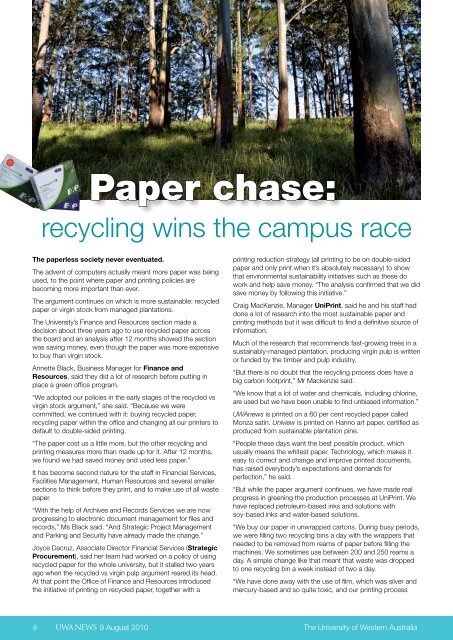
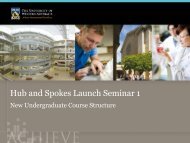
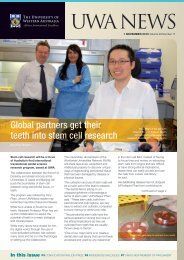
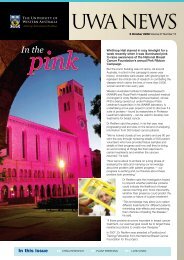
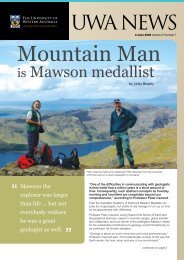
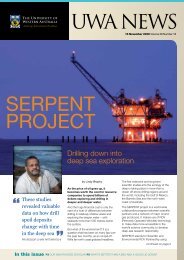
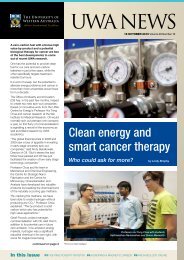


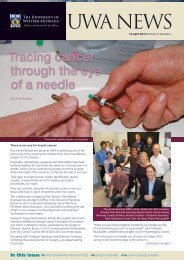
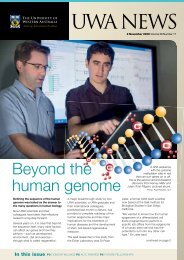
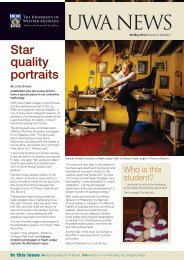
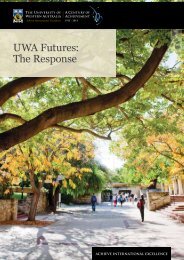
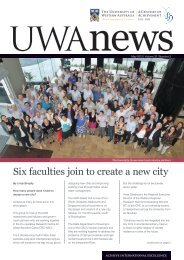
![Issue 13. 6 September 2010.pdf [PDF File, 1.7 MB] - UWA Staff - The ...](https://img.yumpu.com/26619782/1/184x260/issue-13-6-september-2010pdf-pdf-file-17-mb-uwa-staff-the-.jpg?quality=85)